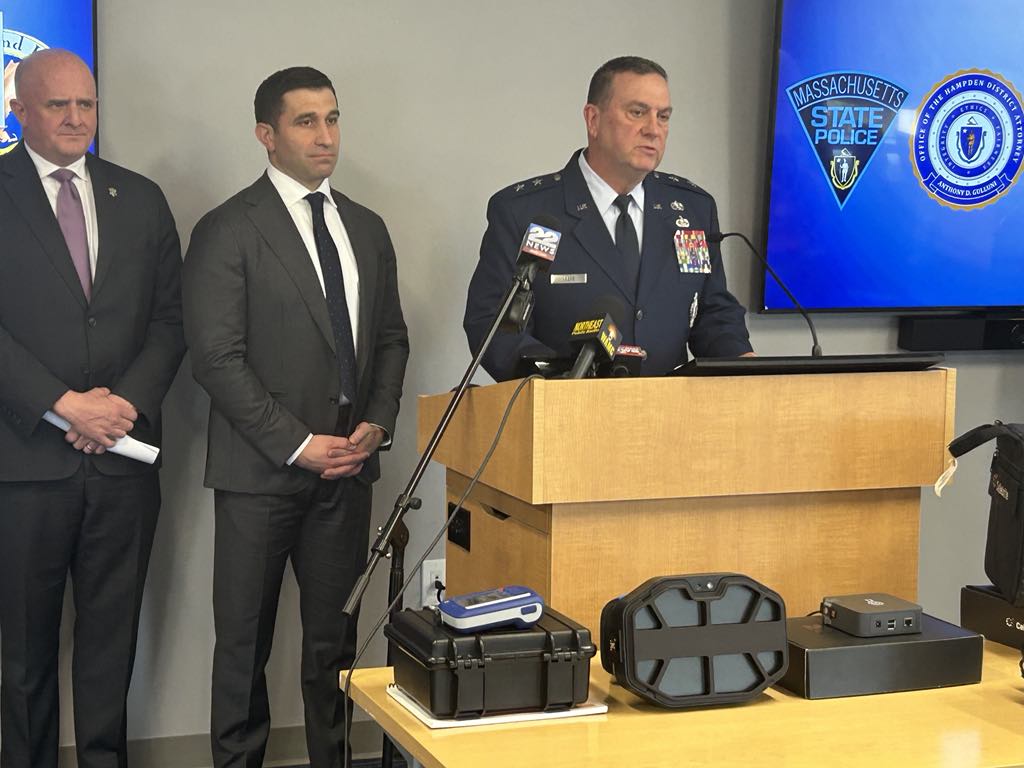Adjutant General of the Massachusetts National Guard Major General Gary Keefe joins Hampden County District Attorney Anthony Gulluni on May 12 to announce a $285,000 donation that the Guard awarded to the Hampden County DA’s office and the Massachusetts State Police for equipment that helps combat illicit drug trafficking.
Reminder Publishing photo by Ryan Feyre
SPRINGFIELD — A decade-long effort to curb illicit drug trafficking in the region was recently buttressed by an investment in new equipment.
Hampden County District Attorney Anthony Gulluni announced at a press conference on May 12 that his office and the State Police have received a $285,000 donation from the Massachusetts National Guard’s counterdrug program to help combat transnational criminal organizations, violent gangs and other drug trafficking organizations in the area.
Among the new equipment funded by the donation are a gray key — a tool for mobile devices that extracts critical information in narcotics investigations — and TruNarc, which is used for rapid analysis and identification of dangerous narcotics.
It also funds a Cellebrite to help manage and organize data from mobile devices in narcotics investigations or prosecutions; as well as a handheld backscatter, which detects narcotics and other contraband through X-ray imagery in homes or vehicles.
Additionally, the money finances an MX 908 drug analyzer for “highly accurate” and “more sensitive” analysis of dangerous drugs, even in trace amounts.
In his remarks to the press, Gulluni said the new equipment will be accessible to his office’s task forces, as well as local and state law enforcement.
“The danger of illicit narcotics to our communities has not abated,” Gulluni said. “As drug dealers and traffickers adopt new methods and acquire new ways to infiltrate our communities, we must stay ahead of them and similarly continue to adapt and evolve our methods of investigation and interdiction.”
Investment in new equipment comes at a time when the number of opioid-related fatal overdoses across the state has remained steady over the past several years. According to Gulluni, Massachusetts experienced between 2,100 to 2,300 opioid-related fatal overdoses over the last few years, and Hampden County specifically has seen an increase in recent years.
In 2015, Gulluni’s office signed a memorandum of understanding with the state’s National Guard to tackle drug trafficking problems that are exacerbating the opioid crisis.
The partnership was renewed in 2018.
“I have said many times, we have to aid and support those suffering from the disease of addiction, but we must also simultaneously deter and arrest those who profit from it,” Gulluni said.
The National Guard’s counterdrug program has helped law enforcement in each state combat illicit drug trafficking since its inception in 1989, according to Gary Keefe, adjutant general of the Massachusetts National Guard.
“We in the guard, we look at these drugs now as weapons,” Keefe said. “We’re very proud to do what we can to continue to support the mission of getting rid of this and making sure that Hampden County and the neighborhoods in Hampden County are safer places for people to live and raise families.”
Gulluni mentioned that the National Guard’s global reach is “a huge aspect of assistance” on his office’s work in the realm of “bigger narcotics investigations.”
As part of the program, the guard has assigned specialized personnel to support both the Hampden DA’s SAFE Narcotics Task Force and the State Police’s Commonwealth Interstate Narcotics Reduction Enforcement Team, according to his office.
“Some of the analysis, linguistic services, etc., are things that locally or even at the state level we might not have access to,” Gulluni said. “So, the federal government through the National Guard can provide that here at the very organic local level to assist us and collaborate to make sure that we’re doing our best work.”
Aside from Gulluni’s partnership with the state police and National Guard, his office also works with the New England High Intensity Drug Trafficking Area, a regional organization that provides funding resources, facilitates and enhances coordination of federal, state and local law enforcement agencies in designated areas.
David Kelley, the deputy director of NEHIDTA, said the organization runs several projects to combat illicit drug trafficking, including its domestic highway enforcement program.
“The I-91 corridor that travels through this state and this county is patrolled by the Massachusetts State Police,” Kelley said. “I will tell you that their efforts on [I-]91 to intercept and prevent drugs from entering these communities is nothing less than stellar, and I am very, very proud that we were able to play a role here today.”


